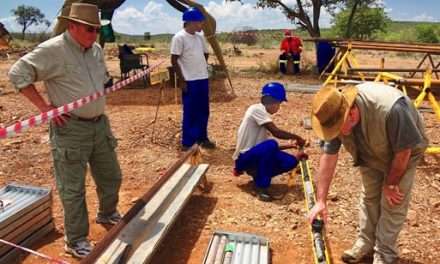
Namibia’s performance in the 2022 Fraser report fairly good says Chamber of Mines president

Namibia’s performance in the 2022 Fraser report is fairly good, although could have been better considering that the government has greatly improved legislation that encourages exploration, according to the Chamber of Mines President, Zebra Kasete said this week.
The 2022 Fraser Institute Survey of Mining Companies showed that Namibia improved on the overall Investment Attractiveness Index (IAI) by 7 points from 52 in 2021 to 59 in 2022.
On this index, Namibia was ranked 38th out of 62 jurisdictions surveyed, compared to 59 out of 84 jurisdictions in 2021. Namibia ranked 6th out of 16 African jurisdictions surveyed on overall investment attractiveness.
The IAI measures a country’s overall competitiveness and combines the Policy Perception Index (PPI) and the Best Practices Mineral Potential Index. The PPI carries a weighting of 40% and the Best Practices Mineral Index carries a weighting of 60%.
According to Kasete, the absolute increase in Namibia’s IAI score was a result of an improvement in the Best Practices Mineral Potential Index which increased by 12 points from 37 in 2021 to 53 in 2022.
The Best Practices Minerals Potential measures a country’s mineral attractiveness which is rated assuming a perfect regulatory and policy environment.
“In 2022, Namibia recorded a 12% increase in exploration expenditure in real terms according to figures captured by the Namibia Statistics Agency. This is likely to have been the main contributor to Namibia’s improved Mineral potential, particularly due to the discovery and active exploration of minerals such as lithium, uranium, and gold,” he added.
In terms of policy performance, Namibia did not fare well, with its absolute score falling by 6 points from 75 in 2021 to 69 in 2022. The contributing factors to a decline in Namibia’s PPI were concerns related to the “Unilateral powers to the Minister of Mines to make various determinations like royalty levels…,” and “…a lack of minerals rights security” as cited by respondents in the survey.
The decline in policy perception is despite the very positive Amendment to the VAT legislation, which now allows exploration companies to register unhindered and claim for input VAT refunds.
This had been an ongoing challenge for some exploration companies, including the Oil & Gas sector, whose input VAT claims were denied on the basis that exploration companies are not producing taxable supplies. Through the consistent advocacy efforts of the Chamber, the Ministry of Finance agreed to amend the VAT Act of 2000 to address the challenges.
The VAT Amendment Act of 2022 was gazetted on 29th December 2022 and became effective on 1 January 2023. This has been a massive win for the industry, and the Chamber strongly believes this would have contributed to a far better score for Namibia’s PPI, he added.
This positive outcome was not reflected in Namibia’s PPI score as the questionnaire for the Fraser Survey closed on 30 December 2022, and the amendment was not yet known to survey respondents. We hope this major positive policy development will contribute to enhancing Namibia’s PPI in the next Fraser report.
However, Namibia was commended in the survey for having “good foreign investment policies into mining.”
Namibia was ranked as the 3rd highest on PPI in Africa, which is evident because Namibia is perceived to have a relatively stable and attractive policy environment compared to other African countries.
Globally, Namibia was ranked 26th on PPI, an improvement of 3 places compared to 2021, another indication that Namibia’s policy environment is viewed more favourably against some international jurisdictions.
The survey indicated that Namibia had a favourable participation rate in the survey, and responses are thus representative of the perceptions held by top tiers of management from Namibian mining and exploration companies. This is another improvement from previous surveys in which the samples were between 5-9 respondents and the Chamber contributed to wider circulation of the questionnaire to the mining and exploration fraternity.
The Chamber of Mines Chief Executive, Veston Malango meanwhile emphasised that the Chamber is actively engaging the Minister of Mines and Energy on the Minerals Bill and is confident that the policy concerns cited in the survey will be addressed in the Minerals Bill review which is at an advanced stage.
“The Chamber is positive that the finalisation of this Bill will elevate Namibia’s overall investment attractiveness in the global mining space,” he said.











































